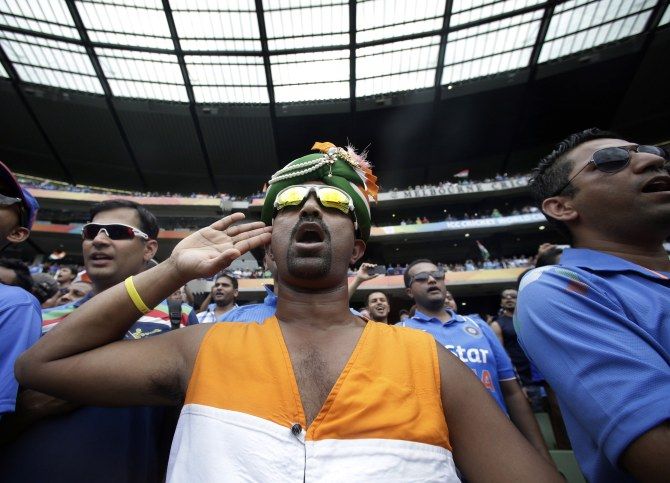Nalini Narayani explains why the National Anthem may have been written in protest against the British.

The recent controversy regarding the national anthem, provoked by Rajasthan Governor Kalyan Singh, has got many revisiting the lyrics of Rabindranath Tagore’s most famous composition.
Singh mentioned in a speech that the word 'adhinayaka’ referred to the British King and therefore must be replaced with 'mangala'. Another word from the composition, 'bhagyavidhata’, also faced the radar for the same reason, many years ago.
Written for an event that makes the motive of the composition ambiguous, many have wondered even in the past if the anthem was written for the country or for King George V!
The 104-year-old argument began in 1911, when the National Anthem was first sung at the welcome ceremony for the then King of England, George V and his wife Mary. But whether it was sung for him or for the nation at large, or in a protest against him, is still a matter of debate.
Here are 5 pointers that incline towards the latter view and seem more plausible too:
Tagore’s letter of correction
First and foremost, Tagore himself, aware of the squabble, wrote not one, but two letters to his friend Pulin Bihari Sen on the issue.
A certain high official in His Majesty’s service, who was also my friend, had requested that I write a song of felicitation towards the Emperor. The request simply amazed me. It caused a great stir in my heart. In response to that great mental turmoil, I pronounced the victory in Jana Gana Mana of that Bhagya Vidhata (God of Destiny) of India who has from age after age held steadfast the reins of India’s chariot through rise and fall, through the straight path and the curved.
That Lord of Destiny, that Reader of the Collective Mind of India, that Perennial Guide, could never be George V, George VI, or any other George. Even my official friend understood this about the song. After all, even if his admiration for the crown was excessive, he was not lacking in simple common sense.
And
“I should only insult myself if I cared to answer those who consider me capable of such unbounded stupidity as to sing in praise of George the Fourth or George the Fifth as the Eternal Charioteer leading the pilgrims on their journey through countless ages of the timeless history of mankind.”
This in itself speaks on his behalf.
Tagore’s ambivalent political view
Tagore never voiced his unswerving devotion to either imperialism or nationalism. He was known to approve of ideas generally, irrespective of which side they came from, as long as they were good for the country.
He in fact believed the rulers to be a “political symptom of our social disease”, urging Indians to acknowledge that “there can be no question of blind revolution, but of steady and purposeful education”.
Highly unlikely that such a man would sing praises of any single ruler in his works, whether Indian or foreign, right?
Rebellion against the British educational system
Tagore simple hated rote learning that the British propounded. He wrote a short story titled, “The Parrot’s Training”, in which a bird which dies is force-fed books by tutors in order to revive it.
In fact he eulogized the Gurukula system of teaching, which he believed was more creative and engaging. Such a man would hardly call the British by the names ‘adhinayaka’ or ‘bhagyavidhata’, don’t you think?
Tiff with Mahatma Gandhi
Tagore never refrained from expressing his honest opinions, irrespective of who he was dealing with. Heck, he didn’t even hesitate from giving the Mahatma a piece of his mind when he disagreed with his methods.
Tagore strongly opposed the Swadeshi movement, calling it ‘The Cult of the Charka’ in one of his essays and thought it ‘antiquated’. Though he admired Gandhi as a leader, he was one of the few intellectuals of the time who wasn’t afraid to stand up to him.
Would a man who condemned the father of the nation write words of praise for rulers he did not support?
The other song
On the same day and at the same event at which the national anthem was sung, another song was also sung, which was in praise of the King. Since the Anthem was sung right before it, many newspapers took both the songs to be in favor of the king, when in fact one was in protest of the regime.
When Tagore, then a well-known litterateur, was asked to sing in praise of George V who was visiting, he wrote this in protest of being asked to do so, thus for the same reason making it an ode to his own country.
All these reasons do point more markedly to the legend’s ambivalent view of politics and his advocacy of universal brotherhood, instead of praise affected by divisions of race and religion.
With his school Shantinikatan also promoting universal brotherhood, it seems highly unlikely that the anthem was meant to flatter the rulers.
In any case, the meaning given to anything is based on the individual engaging with it. Why not say the same for the National Anthem and leave a well-meaning man the hell alone?!
Also read:
10 inspiring life lessons from Gurudev Rabindranath Tagore we should never forget












 © 2025
© 2025